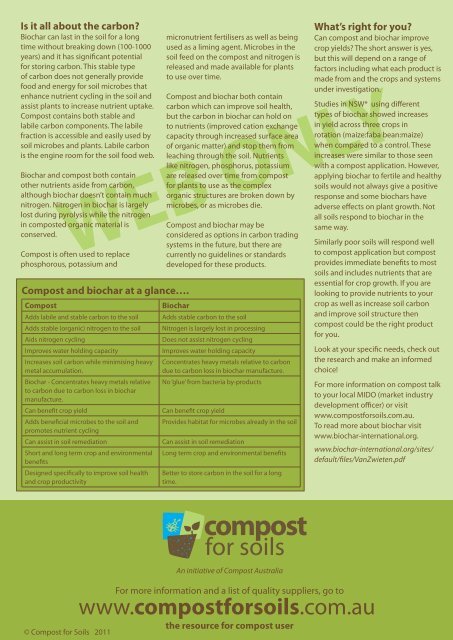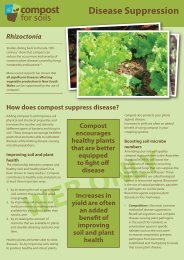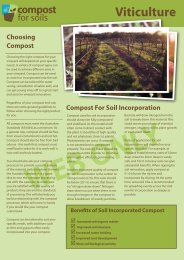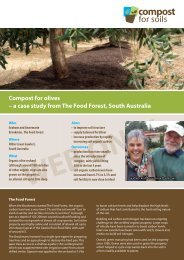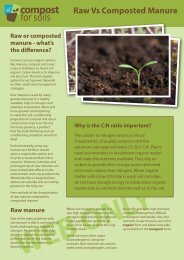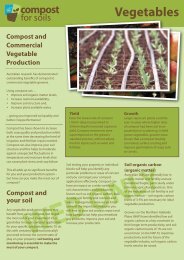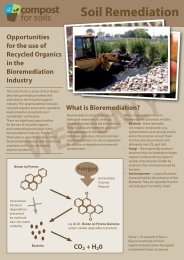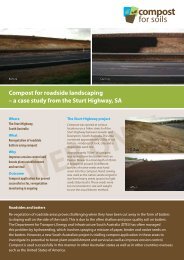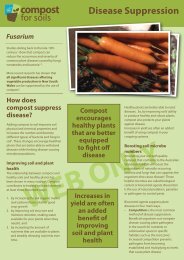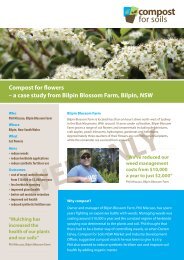Create successful ePaper yourself
Turn your PDF publications into a flip-book with our unique Google optimized e-Paper software.
Is it all about the carbon<br />
Biochar can last in the soil <strong>for</strong> a long<br />
time without breaking down (100-1000<br />
years) and it has significant potential<br />
<strong>for</strong> storing carbon. This stable type<br />
of carbon does not generally provide<br />
food and energy <strong>for</strong> soil microbes that<br />
enhance nutrient cycling in the soil and<br />
assist plants to increase nutrient uptake.<br />
<strong>Compost</strong> contains both stable and<br />
labile carbon components. The labile<br />
fraction is accessible and easily used by<br />
soil microbes and plants. Labile carbon<br />
is the engine room <strong>for</strong> the soil food web.<br />
Biochar and compost both contain<br />
other nutrients aside from carbon,<br />
although biochar doesn’t contain much<br />
nitrogen. Nitrogen in biochar is largely<br />
lost during pyrolysis while the nitrogen<br />
in composted organic material is<br />
conserved.<br />
<strong>Compost</strong> is often used to replace<br />
phosphorous, potassium and<br />
<strong>Compost</strong> and biochar at a glance….<br />
<strong>Compost</strong><br />
Adds labile and stable carbon to the soil<br />
Adds stable (organic) nitrogen to the soil<br />
Aids nitrogen cycling<br />
Improves water holding capacity<br />
Increases soil carbon while minimising heavy<br />
metal accumulation.<br />
Biochar - Concentrates heavy metals relative<br />
to carbon due to carbon loss in biochar<br />
manufacture.<br />
Can benefit crop yield<br />
Adds beneficial microbes to the soil and<br />
promotes nutrient cycling<br />
Can assist in soil remediation<br />
Short and long term crop and environmental<br />
benefits<br />
Designed specifically to improve soil health<br />
and crop productivity<br />
micronutrient fertilisers as well as being<br />
used as a liming agent. Microbes in the<br />
soil feed on the compost and nitrogen is<br />
released and made available <strong>for</strong> plants<br />
to use over time.<br />
<strong>Compost</strong> and biochar both contain<br />
carbon which can improve soil health,<br />
but the carbon in biochar can hold on<br />
to nutrients (improved cation exchange<br />
capacity through increased surface area<br />
of organic matter) and stop them from<br />
leaching through the soil. Nutrients<br />
like nitrogen, phosphorus, potassium<br />
are released over time from compost<br />
<strong>for</strong> plants to use as the complex<br />
organic structures are broken down by<br />
microbes, or as microbes die.<br />
<strong>Compost</strong> and biochar may be<br />
considered as options in carbon trading<br />
systems in the future, but there are<br />
currently no guidelines or standards<br />
developed <strong>for</strong> these products.<br />
Biochar<br />
Adds stable carbon to the soil<br />
Nitrogen is largely lost in processing<br />
Does not assist nitrogen cycling<br />
Improves water holding capacity<br />
Concentrates heavy metals relative to carbon<br />
due to carbon loss in biochar manufacture.<br />
No ‘glue’ from bacteria by-products<br />
Can benefit crop yield<br />
Provides habitat <strong>for</strong> microbes already in the soil<br />
Can assist in soil remediation<br />
Long term crop and environmental benefits<br />
Better to store carbon in the soil <strong>for</strong> a long<br />
time.<br />
What’s right <strong>for</strong> you<br />
Can compost and biochar improve<br />
crop yields The short answer is yes,<br />
but this will depend on a range of<br />
factors including what each product is<br />
made from and the crops and systems<br />
under investigation.<br />
Studies in NSW* using different<br />
types of biochar showed increases<br />
in yield across three crops in<br />
rotation (maize:faba bean:maize)<br />
when compared to a control. These<br />
increases were similar to those seen<br />
with a compost application. However,<br />
applying biochar to fertile and healthy<br />
soils would not always give a positive<br />
response and some biochars have<br />
adverse effects on plant growth. Not<br />
all soils respond to biochar in the<br />
same way.<br />
Similarly poor soils will respond well<br />
to compost application but compost<br />
provides immediate benefits to most<br />
soils and includes nutrients that are<br />
essential <strong>for</strong> crop growth. If you are<br />
looking to provide nutrients to your<br />
crop as well as increase soil carbon<br />
and improve soil structure then<br />
compost could be the right product<br />
<strong>for</strong> you.<br />
Look at your specific needs, check out<br />
the research and make an in<strong>for</strong>med<br />
choice!<br />
For more in<strong>for</strong>mation on compost talk<br />
to your local MIDO (market industry<br />
development officer) or visit<br />
www.compost<strong>for</strong>soils.com.au.<br />
To read more about biochar visit<br />
www.biochar-international.org.<br />
www.biochar-international.org/sites/<br />
default/files/VanZwieten.pdf<br />
© <strong>Compost</strong> <strong>for</strong> <strong>Soils</strong> 2011<br />
o<br />
<br />
An initiative of <strong>Compost</strong> Australia<br />
For more in<strong>for</strong>mation and a list of quality suppliers, go to<br />
www.compost<strong>for</strong>soils.com.au<br />
the resource <strong>for</strong> compost user


